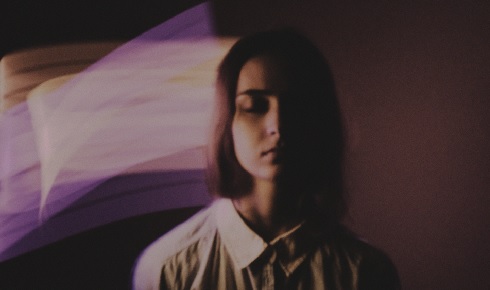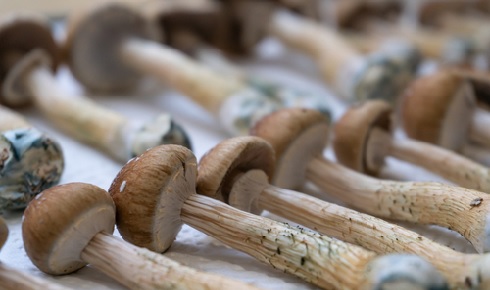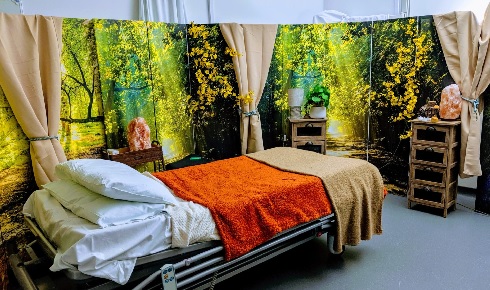Mind-blowing research

The use of psychedelic substances as treatments for conditions like depression will revolutionise mental health care and represents the biggest innovation in psychiatry since the 1950s, says Professor David Nutt
September 8th 2021
Professor David Nutt is a neuropsychopharmacologist specialising in drugs that affect the brain. He recently took over as director of Imperial’s Centre for Psychedelic Research, which since opening in 2019 has been exploring the use of psychedelic drugs in mental health care and as tools to study consciousness.
There is growing evidence that psychedelic substances, in combination with psychotherapy, can be used to treat mental illnesses like depression and addiction. But in almost every country in the world, psychedelic drugs remain classified as Schedule 1 controlled substances, defined as ‘having no therapeutic value’ – and therefore cannot be lawfully possessed or prescribed.
Despite the complications this creates for research, the last decade has seen a renaissance in this field of study, with promising results in trials for disorders including severe depression, anxiety, and post-traumatic stress disorder.
Earlier this year Nutt’s group at Imperial began a new trial comparing psilocybin therapy [the psychoactive ingredient in ‘magic mushrooms’] with a conventional antidepressant drug, and trials exploring psychedelic therapy for obsessive compulsive disorder, chronic pain and anorexia will begin later this year.
- This interview focuses on the administration of psychedelic substances under controlled clinical trial conditions, not through self-administration or recreational use. For more information see www. imperial.ac.uk/psychedelic-research-centre
Hi David. Can you explain briefly what happens to the brain of a person taking psychedelic drugs?
The cortex is loaded with receptors called 2A receptors, where psychedelics like LSD and psilocybin act. Back in the 1980s, when I first started to try and understand what a psychedelic experience was, we couldn't study these receptors with psychedelics, so we studied them with a drug that blocked them instead. The paradox was that when we blocked these receptors, very little happened. The only major thing you find we found is the brain synchronises into deep sleep more easily. What does that mean? The blockers were explored as sleep improvers and anti-anxiety medications but never got off the ground.
Now, almost 40 years on, we actually can do studies where we give the agonist of these receptors, and can say wow – they do exactly the opposite. The antagonist increases brain synchronicity, but the agonist disrupts: they make a very disorganised or chaotic brain, an entropic brain. That was our great discovery, that psychedelics basically disorganised the structured way in which the brain circuits work as a segregated series. That's why you get strange experiences like synaesthesia, hallucinations, distortion and disillusion.
The Centre for Psychedelic Research launched in 2019, the same year that the Johns Hopkins University also announced a big centre dedicated to psychedelic research. What led to the field of psychedelic research making these big steps forward at this particular time?
Well obviously I’m biased but I think our group did two really landmark things: showing how the brain was changed by psychedelics, and how the processes changed were compatible with antidepressant, anti-anxiety or even anti-addiction effects. While we worked out how these drugs work in the brain, a group in the USA showed that in depression, the particular network which encodes a sense of self, known as the default mode network, was over-engaged in depression. With psychedelics, you completely destroy the default mode network, which is why people feel that they're not themselves, and some people say they atomize, or they float out of the scanner and they go off to another universe or other dimension.
So, we thought if the default mode is driving depression and we can disrupt it, maybe we can disrupt depression. Also, one of the areas in the brain which is particularly affected by psychedelics is an area of the brain called the subgenual cingulate cortex. Many studies – studies of antidepressants, of psychotherapy, of electroconvulsive therapy – have shown that getting better from depression, even if a placebo effect, involves reduced activity in this region. So we thought if we can disrupt the default mode network and we can switch off the subgenual, maybe it'll work in depression.

There are a range of different substances being explored as potential aids to psychotherapy – psilocybin [magic mushrooms], LSD, DMT [ayahuasca]. How do they differ?
They are not as profoundly different as you might think – it's all dose related. They all basically desegregate the brain, so it becomes much more connected.
DMT is an unusual drug and also works on another receptor of the brain called the sigma receptor. So it is possible that some of the effects of DMT are driven by that sigma stimulation. But, the major difference is in the pharmacokinetics. The reason DMT blasts people into another dimension is because it changes the brain so fast that the contrast is overwhelming. Whereas with drugs like LSD and psilocybin taken orally, the effect builds up over 30 minutes to an hour, and the brain therefore is adapting to some extent.
There are different psychedelics - salvia, which works in a different part of the brain is not hallucinogenic but is very distorting of our perceptions, and GABAergic psychedelics – no-one's ever scanned people on those. That's the ‘Alice in Wonderland’ pill that makes you go bigger and smaller; it probably works largely in the visual cortex to distort size perception.
So yes, there are different psychedelics, but all the ones that work on the 2A receptor are probably doing almost exactly the same thing.
A key question in this field is whether the intense emotional and often spiritual experiences that accompany the administration of the drug are fundamental to a successful outcome. Could pharmaceuticals be developed that don’t involve the mind-blowing trips?
Great question! There are several strands of answers to that. Firstly, lots of people use microdosing LCD or mushrooms - a dose that doesn’t cause a psychedelic effect – to improve their mood or creativity. The evidence is that it's mostly placebo, but that’s fine – half of what we see in all medicine is placebo.
Secondly, there are now lots of companies trying to work in the psychedelic space, and some are claiming that they can make non-hallucinogenic drugs that are also going to be therapeutic. This is normally based on some derivative of psilocybin which doesn’t cause a head twitch in mice. My view is that I don't know that head twitching in a mouse is a very good proxy for the human experience. It’s great for raising investment money but I think we've got to give it to humans first.
The third is about dose: it might just be that a bigger dose is more likely to both be mystical as well as being an antidepressant.
But the fourth thing is: these powerful experiences, are they more than just a dose effect? I think they might be. One of the things we have learned from our work is that depressed people don't generally come back saying that they've seen God, they don't have a mystical experience in the same way as people using these drugs to achieve insights and transformation. What they do get are insights into the nature of their depression and the factors perpetuating their depression. They might see their parents as the devil, for example. So I think those kinds of insights, which are not mystical in the traditional sense, are very powerful.
Ketamine, which is an anaesthetic, can disrupt depressive thinking, but not for very long. We think that might be because it actually blocks the systems required for new learning and new concepts. And so even if it did make you trip, you wouldn’t remember it.
How do you record these ‘insights’ and hallucinogenic experiences, which might be so strange that the patient can’t even express it in words themselves?
Well we don't do any work during the trip. It's just impossible to engage with people when they're in a whole new place so we record interviews with them the day after. It's not my field of expertise, but there are algorithms that work out the nature of the speech and the content and themes that allows us to code and analyse them.
One of my favourite papers explores the narratives of people recovering from depression under psilocybin. One of the key things is connectedness: people coming out of trips, whether they're depressed patients or not, feel more connected with the world, with nature, to other people. This actually fits rather beautifully with the neuroscience, because what psychedelics do is they break down the existing modes of thinking. So people become more interested in what's outside rather than what's inside.
I saw that you're gathering data from people that take psychedelics in their own time. Can you tell me a bit more about that and what you hope to gain from that?
We've done a lot of surveys of people going on retreats and taking psychedelics and other drugs. It's very useful because you can get them to log in and do rating scales, cognitive tasks, or look at things like personality variables before and after. We get information which we could never get experimentally. Our microdosing study was a self-administration study and we even managed to blind it.
That data shows what people are using the drugs for and usually it's not for fun, or just to get high. It's usually for trying to make sense of their lives and have a better understanding of themselves. It also gives us lots of safety data because we discovered that there are relatively few unwanted effects, and it also has given us some pointers. For instance, one of the things we have discovered is that people with quite severe personality problems tend not to do very well on psychedelics.

“The literal and figurative blurred" - a psychedelic experience at the CPR
Then came the first dose, a capsule taken with water. I was nervous but eager, and donned an eye mask and headphones for an immersive experience. For me, there were no swirling colours or hallucinations, it was more like a waking dream – images in my mind’s eye with no substance, but conjured by my imagination to interpret what I was feeling.
As I sank into the trip I felt a pressure in my chest and remember thinking my heart was breaking, then it slowly extended until I felt crushed under the weight of my depression. The literal and figurative blurred – it felt like real weight but it didn’t physically hurt. Suddenly, the pressure vanished and I was alone in the dark. No, not alone, there was another ‘me’ there: my self-doubt. So manifested, I was finally able to let go of ‘her’ completely. My unburdened self was then reintroduced to positive emotions – love, happiness, appreciation, and many others I’d forgotten. I was able to understand with clarity the people and things that were important to me.
A few hours in, I removed the eye mask. Everything had taken on a red/green hue as if I were looking through 3D glasses, and as I breathed the world breathed with me, literally pulsing. I felt delighted and truly connected. I remember looking at myself in the bathroom mirror and for the first time in years being happy with what was reflected there.
The whole experience was incredibly healing and uplifting in ways I couldn’t have imagined back when depression still darkened my life. Psilocybin crystallised the root of my illness as self-doubt, and it allowed me to let go of that and reconnect with friends and family after years of feeling alone and isolated.”
Tell me a little bit about how you're funding this work because I noticed that you're not funded by any of the major research councils. Have they refused to support this work?
The first depression studyX was funded by the MRC. Every other study I've put in subsequently, studies in eating disorders, pain, obesity, have been rejected. I think it's because the model doesn't fit the traditional pharmaceutical model.
Fortunately, there are plenty of people out there who have made a lot of money and think psychedelics have contributed to that and fund us philanthropically. Also, now there are companies being set up [to manufacture therapeutic psychedelics] and it may be that they will also facilitate our work. We get our medicines from those companies at present, which saves us some funding.
Your name has become synonymous with the idea of liberalising drug laws. Do you think that will have an impact on how people view your research on psychedelics and the work of the centre?
How dare you – I call it rationalising drug laws! Of course, some people will think “it's just crazy Nutt banging on again”. But one of the reasons I was able to start this work with confidence when we did our first administration of psilocybin to humans in 2008 was because I had, working with the government, produced the definitive way of assessing drug harms. Those data showed me absolutely, categorically, without any equivocation that psilocybin was a very safe drug. I was confident that using it in science was going to be relatively benign and it has been.
My arguments with the government have been that the drug laws are actually not based on any evidence. On top of that, now it's increasingly clear that those drug laws are a severe impediment to research. It's actually the worst censorship of scientific research in history. Before LSD was banned in 1967 there had been six US-funded trials of one or two doses of LSD to treat alcoholism, and the effect size was one, which is twice the effect size of any subsequent treatment for alcoholism. Since 1967 there has not been a single further trial of it as a treatment for alcoholism. Suppose that LSD had just worked on just 10% of 100 million people who have died from alcoholism since?
Do you think that governments will reconsider the laws around their use?
These drugs are still illegal in every country in the world, except ayahuasca in South America. They are still controlled Schedule 1 substances. We can't even use them in medicine yet, except in research, which is outrageous. I think patient pressure will force governments to open them up for patient use in the same way as patient pressure opened up the use of medical cannabis.
I don't like the term ‘recreational use’ for psychedelics, as I think people who use psychedelics are not doing it for fun. People use them for self-exploration. Personally, I'd be completely comfortable with a regulated market for psychedelics, where you might be able to get them on a prescription on a smart card, maybe three or four times a year from a local pharmacy. But I'm not lobbying for regulated market, I am lobbying for them to be available in medicine because it is truly outrageous that they're not and they haven't been for 50 years.
There's a strong history within psychedelic research of scientists testing substances on themselves. Have you or do you use any of the substances we’ve talked about?
I never answer questions about anything that might get me arrested. And I never answer questions about that because it takes the focus away from the science – I don't want to be the subject of discussion. And whatever I say is wrong: half the world will hate me either way.
Presuming further trials are successful, how could this model of treatment be scaled up? Treating patients in this way is very different to giving someone a packet of pills or existing talking therapies.
We need more therapists, we need psychiatrists who are interested, we need psychologists who are interested. I think this is going to be the great revolution in psychiatry in the next 20 to 30 years, bringing psychotherapy and pharmacology together into psychedelic psychotherapy. It's a very exciting time.
Professor David Nutt is the Edmund J Safra Professor of Neuropsychopharmacology and director of the Centre for Psychedelic Research at Imperial College, London.
1) Carhart-Harris, R.L. et al. Neural correlates of the psychedelic state as determined by fMRI studies with psilocybin. Proceedings of the National Academy of Sciences 109(6), 2138-2143 (2012).
2) Watts, R. et al. Patients’ Accounts of Increased “Connectedness” and “Acceptance” After Psilocybin for Treatment-Resistant Depression. Journal of Humanistic Psychology 57(5), (2017)
3) Trial of Psilocybin versus Escitalopram for Depression. New England Journal of Medicine 384, 1402-1411 (2021)
4) Carhart-Harris, R.L. et al. Psilocybin with psychological support for treatment-resistant depression: an open-label feasibility study. The Lancet Psychiatry 3 (7), 619-627 (2016).
5) Carhart-Harris, R.L., Roseman, L., Bolstridge, M. et al. Psilocybin for treatment-resistant depression: fMRI-measured brain mechanisms. Scientific Reports 7, 13187 (2017).


